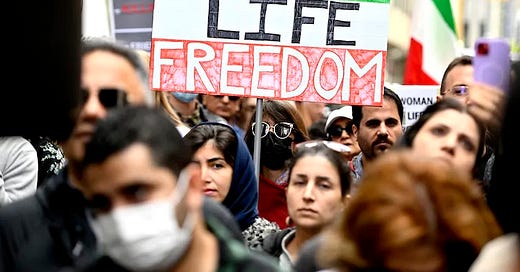Image: Canadian Press/Justin Tang
Like everyone else, I’ve been riveted by the massive wave of protests in Iran. While we’ve seen repeated waves of protests in recent years, usually around economic issues, the mobilization triggered by the killing of Mahsa Amini has been genuinely remarkable. As Ali Kadivar notes in a TMC piece, these protests have been led by women and have attracted a much broader range of support than previous waves. The challenge to the enforcement of hijab has escalated into broader critique of the regime, with women’s rights joining the complaints about corruption, economic struggles, and closing opportunities for democratic participation.
I’m writing something longer about the lessons of the Arab uprisings for the Iran protests (most of them pretty dismal) but for now I just wanted to highlight some books on Iranian women and on women in the Arab uprisings which may be relevant for thinking about their role today in Iran. Obviously the context is different, but some of the dynamics which I’m seeing described as unique to Iran really aren’t. There’s such a rich, vast literature on women’s movements in Iran and the Arab world, so I’m going to limit myself to recent books which I’ve reviewed or featured on my podcast.
First, a couple of months ago, I reviewed Nazanin Shahrokni’s great book Women in Place: The Politics of Gender Segregation in Iran. I highly recommend looking at that if you’re curious about the evolution of the enforcement of gender discrimination in public places in Tehran - an obviously central question for today’s protest wave. I just recorded a fascinating interview with her for my podcast — keep an ear out for it on Thursday (and subscribe on Spotify to make sure you don’t miss any episodes).
I’ve recently been reading Shirin Saeidi’s fascinating ethnographic look at the enforcement and resistance to veiling and gender segregation (among many other things). Women in the Islamic Republic: How Gendered Citizenship Conditions the Iranian State, just published this year, focuses on the 1980s more than on the present era. Saeidi examines gendered citizenship through a diverse set of lenses, focusing less on elite liberal feminists than on non-elite women and - in one especially interesting chapter - Islamist cultural activists. It’s a complex, deeply felt narrative which shows the competing discourses connecting citizenship and state formation, and the central place of gender in the construction of Iranian citizenship.
Finally, even though it isn’t specifically about women, I really learned a lot about Iranian activism from Paola Rivetti’s Political Participation in Iran from Khatami to the Green Movement. Rivetti digs deep into the reformist trend and the Green Movement, showing their diverse perspectives and objectives, their frustrations and their successful formation of new political subjectivities. What makes it especially interesting for the current wave of protests is her exploration of how activists engage with the state, with some participation viewed as legitimate and welcomed by the regime because it shows citizen engagement on its terms and other activism viewed as unacceptable and illegitimate. It seems pretty clear where the current anti-hijab protests would fall in that regard. (Listen to her on my podcast here.)
What about the lessons from the Arab uprisings? First, I’d like to highlight two outstanding books on the Egyptian revolution: Nermin Allam’s Women in the Egyptian Revolution (listen to our podcast conversation here) and Sherine Hafez’s Women of the Midan (listen to our podcast conversation here). Both books do an exemplary job of recovering the conflicted experiences of women during the 2011 revolutionary moment and in the subsequent turbulent transition. Neither offers clear lessons about the causal effects of women’s participation in protests; that isn’t the point. Instead, they focus on the transformative effects of participation on women themselves, the discovery of new identities and agency, the power of hope, the struggles with frustration and despair. They point us towards thinking about the deep effects of Iran’s protests wave on Iranian women, not just on the fall or survival of the regime.
For a wider lens analytical approach to the participation of women in the Arab uprisings protests, I’d recommend Shamiran Mako and Valentine Moghadam's recent After the Arab Uprisings (listen to their podcast conversation here). They center gender in their analysis of the drivers and outcomes of the various Arab uprisings more than most any other book length treatments. They survey the status of women’s mobilization and civil society participation across each of the Arab uprising cases, carefully documenting their strengths and weaknesses and linking those to the emergence of protests and the outcomes of transitions.
Nicola Pratt’s Embodying Geopolitics: Generations of Women’s Activism in Egypt, Jordan, and Lebanon widens the lens in another way (listen to our podcast conversation here). Pratt traces women’s activism across generations, as the title suggest, opening a window into longer term societal trends as well as to a broader conception of what success and failure mean in this context. Pratt collected personal narratives from over a hundred women of different ages, backgrounds and political identities, and - like Allam and Hafez - centers their voices and their experiences in ways which really enrich our understanding of their activism.
Finally, Sudan’s 2019 revolution is a recent key case where women took a leading role in the mobilization of protest. Willow Berridge, Justin Lynch, Raga Makawi and Alex de Waal’s Sudan’s Unfinished Democracy: The Promise and Betrayal of a People’s Revolution is the best book length treatment of that uprising. As I discuss in my review, they do an outstanding job of showing the historical evolution of protest in Sudan, the recurrent cycles from which activists learned critical lessons. As the authors show, women were central to the resilience, creativity, and discipline of these protests — and then marginalized from the political transition, with predictably negative effects.
I’m sure I’ve left out a lot of great books - and hopefully you all will have suggestions for what I should read next!





